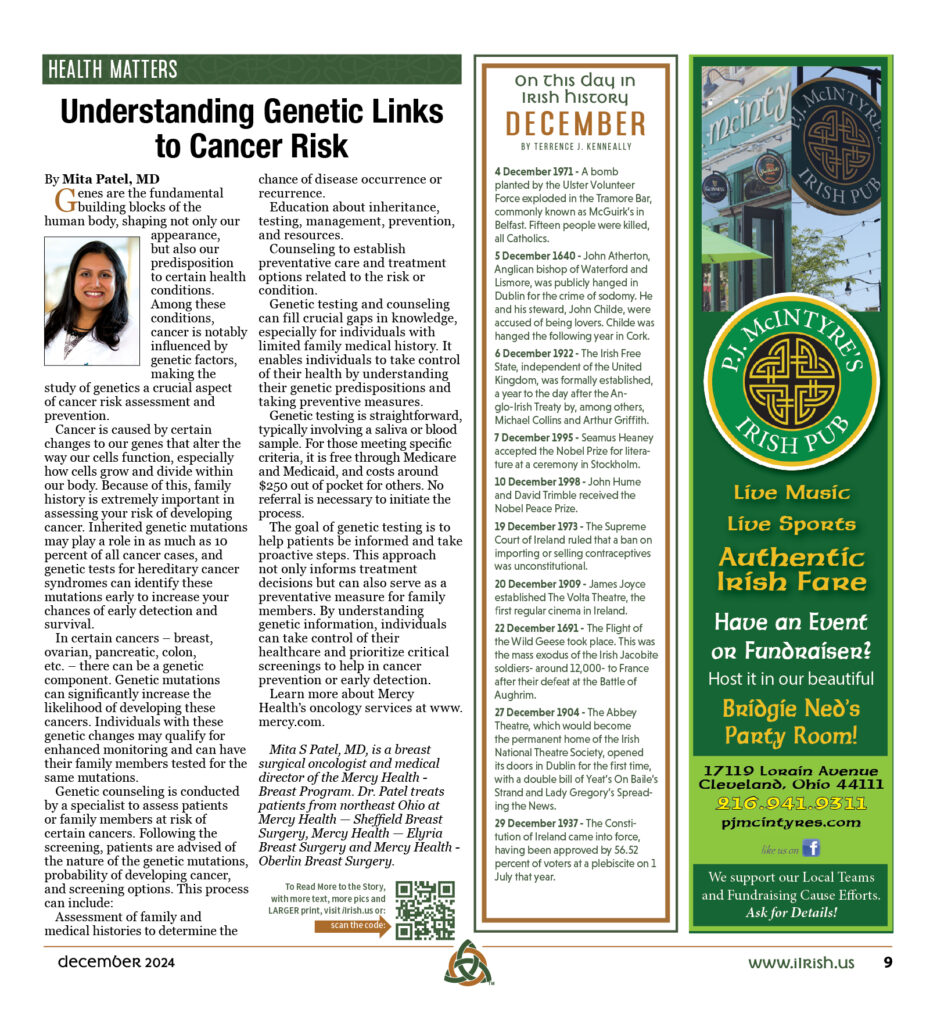Health Matters: Understanding Genetic Links to Cancer Risks

By Mita Patel, MD
Genes are the fundamental building blocks of the human body, shaping not only our appearance, but also our predisposition to certain health conditions. Among these conditions, cancer is notably influenced by genetic factors, making the study of genetics a crucial aspect of cancer risk assessment and prevention.
Cancer is caused by certain changes to our genes that alter the way our cells function, especially how cells grow and divide within our body. Because of this, family history is extremely important in assessing your risk of developing cancer. Inherited genetic mutations may play a role in as much as 10 percent of all cancer cases, and genetic tests for hereditary cancer syndromes can identify these mutations early to increase your chances of early detection and survival.
In certain cancers – breast, ovarian, pancreatic, colon, etc. – there can be a genetic component. Genetic mutations can significantly increase the likelihood of developing these cancers. Individuals with these genetic changes may qualify for enhanced monitoring and can have their family members tested for the same mutations.
Genetic counseling is conducted by a specialist to assess patients or family members at risk of certain cancers. Following the screening, patients are advised of the nature of the genetic mutations, probability of developing cancer, and screening options. This process can include:
- Assessment of family and medical histories to determine the chance of disease occurrence or recurrence.
- Education about inheritance, testing, management, prevention, and resources.
- Counseling to establish preventative care and treatment options related to the risk or condition.
Genetic testing and counseling can fill crucial gaps in knowledge, especially for individuals with limited family medical history. It enables individuals to take control of their health by understanding their genetic predispositions and taking preventive measures.
Genetic testing is straightforward, typically involving a saliva or blood sample. For those meeting specific criteria, it is free through Medicare and Medicaid, and costs around $250 out of pocket for others. No referral is necessary to initiate the process.
The goal of genetic testing is to help patients be informed and take proactive steps. This approach not only informs treatment decisions but can also serve as a preventative measure for family members. By understanding genetic information, individuals can take control of their healthcare and prioritize critical screenings to help in cancer prevention or early detection.
Learn more about Mercy Health’s oncology services at www.mercy.com
To read more Health Matters Columns, Click: HERE

This Just In: In Celebration of St. Valentine’s Day: US Immigration Options for Couples Webinar
This is happening, be in the know

Columbus Irish: Full slate of fantastic events, Traditions to Come This Year
Info on fun St. Pat’s Day, Parade, events and traditions showcased in and around Columbus this year.
This Just In: Toledo Irish Announce parade Plans
This is happening, be in the know
*Dr. Mita S Patel, MD, is a breast surgical oncologist and medical director of the Mercy Health – Breast Program. Dr. Patel treats patients from northeast Ohio at Mercy Health — Sheffield Breast Surgery, Mercy Health — Elyria Breast Surgery and Mercy Health – Oberlin Breast Surgery.





